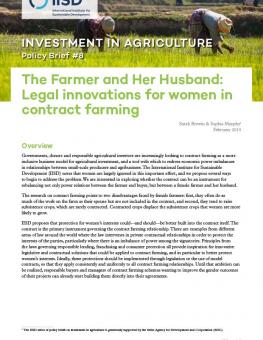
The Farmer and Her Husband: Legal innovations for women in contract farming
Read our policy brief to learn how contracts, if designed with women’s interests in mind, can help foster more balanced relationships between farmers and buyers, as well as female farmers and their husbands.
Contracts designed with women’s interests in mind can help foster more balanced relationships between farmers and buyers, as well as female farmers and their husbands.
Key Messages
- Contracts are effectively private agreements between parties, but the state has an important role in regulating these agreements to protect weaker parties or third parties who could be harmed by a contract, even if they are not included as contract parties.
- Women are central to agriculture but are rarely represented in contracts used in contract farming. This paper gives concrete examples of how agricultural contract regulation could be strengthened to protect women’s rights.
Contracts have become an increasingly common tool for governing relationships between farmers and agribusinesses, in a practice known as contract farming. To date, these contracts have not always been designed in a way that protects female farmers’ interests and ensures that their voices are heard. Meanwhile, women do the bulk of the work on farms, and also tend to produce subsistence crops for feeding the household, which are often displaced by crops grown to satisfy the demands of contract farming.
This policy brief, available in English and French, examines options for building protections into contracts to safeguard female farmers’ interests, while also ensuring that women have a greater opportunity to act in their own interests when these contracts are being negotiated.
We focus specifically on four key objectives, namely free and active consent to contracts; incentives for including female farmers as contract parties; contract language ensuring that women have the standing to enforce and benefit from these arrangements; and provisions that require that all parties have a clear understanding of what a contract farming relationship entails.
We provide draft articles for inclusion in contracts that reflect the above objectives. We also suggest complementary legal measures that could support the implementation of these contracts. The draft articles that we include are drawn from, or inspired by, examples from existing laws that set clear rules governing contracts, in order for these agreements ensure the interests and negotiating ability of vulnerable parties.
Additional downloads
You might also be interested in
Sustainable Asset Valuation of the Nutrition Sensitive Agriculture Capacity Strengthening Project in Ethiopia
This report analyzes the social, economic, and environmental outcomes of implementing agroforestry and climate-smart agriculture in Ethiopia.
Good COP? Bad COP?: Food systems at COP29
The 29th United Nations Climate Conference (COP 29) in Baku failed to build on the notable progress made on food systems at COP 28. However, it wasn't all doom and gloom.
IISD Trade and Sustainability Review, December 2024
This edition of the IISD Trade and Sustainability Review presents four expert perspectives on how agricultural support and subsidies can promote sustainability in developing and least developed countries.
The Responsible Agricultural Investment Tool for Agribusiness and Case Studies
This report summarizes a collaboration to support agribusinesses in complying with principles of responsible investment in agriculture and food systems.